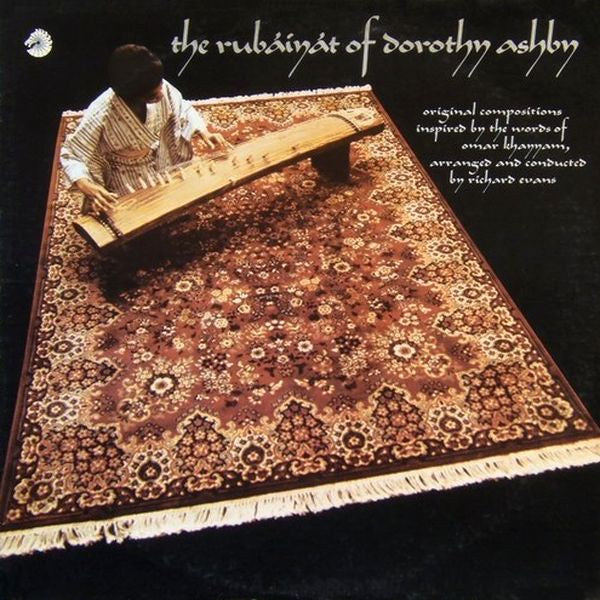Dorothy Ashby The Rubaiyat Of Dorothy Ashby (2023 Reissue)
Cadet / Verve / Universal Music Recordings
-
Regular price
-
$48.00 SGD
-
Regular price
-
-
Sale price
-
$48.00 SGD
- Unit price
-
per
Couldn't load pickup availability
About
Issued on Cadet in 1970, The Rubaiyat of Dorothy Ashby is really a left-field offering for the jazz harpist. But being a jazz harpist was -- and remains -- an outside thing in the tradition. Her previous offerings on Prestige were pure, hard bop jazz with serious session players soloing all over them. She made recordings for Atlantic and Jazzland before landing at Chess in 1968 with Afro-Harping which began her partnership with arranger Richard Evans. Ashby became content as an iconoclast and was seemingly moving forward toward the deep well of spiritual jazz in the aftermath of John Coltrane's death and the recordings of Pharoah Sanders and Alice Coltrane.
On this set for Cadet, she again teams with Evans who wears the hats of producer, arranger, and conductor of a string section and the record goes in a somewhat different direction. Whereas Afro-Harping hit on a direction for Ashby and cemented her relationship with Evans, Rubaiyat realizes that partnership in total. With a band that included a host of percussion instruments — Stu Katz played vibes and kalimba, and Fred Katz played a second kalimba, Cash McCall was enlisted as guitarist, Cliff Davis played alto saxophone, and Lenny Druss played flute, oboe, bass flute, and piccolo. There is also a bass player and a drummer but they are not credited. For her part, Ashby played her harp, but she also brought the Japanese koto into the mix as well as her voice. Rubaiyat is no ordinary jazz vocal album. It is exotic, mysterious, laid-back, and full of gentle grooves and soul. — (via AllMusic)
↓
Label: Verve Records, Cadet
Series: Verve By Request
Format: Vinyl, LP, Album, Reissue, Stereo, 180g
Reissued: 2023 / Original Release: 1970
Genre: Jazz
Style: Soul-Jazz
File under: Jazz // Soul-Jazz / Jazz-Funk
⦿
Share
Cadet / Verve / Universal Music Recordings
- Regular price
- $48.00 SGD
- Regular price
-
- Sale price
- $48.00 SGD
- Unit price
- per
Couldn't load pickup availability
About
Issued on Cadet in 1970, The Rubaiyat of Dorothy Ashby is really a left-field offering for the jazz harpist. But being a jazz harpist was -- and remains -- an outside thing in the tradition. Her previous offerings on Prestige were pure, hard bop jazz with serious session players soloing all over them. She made recordings for Atlantic and Jazzland before landing at Chess in 1968 with Afro-Harping which began her partnership with arranger Richard Evans. Ashby became content as an iconoclast and was seemingly moving forward toward the deep well of spiritual jazz in the aftermath of John Coltrane's death and the recordings of Pharoah Sanders and Alice Coltrane.
On this set for Cadet, she again teams with Evans who wears the hats of producer, arranger, and conductor of a string section and the record goes in a somewhat different direction. Whereas Afro-Harping hit on a direction for Ashby and cemented her relationship with Evans, Rubaiyat realizes that partnership in total. With a band that included a host of percussion instruments — Stu Katz played vibes and kalimba, and Fred Katz played a second kalimba, Cash McCall was enlisted as guitarist, Cliff Davis played alto saxophone, and Lenny Druss played flute, oboe, bass flute, and piccolo. There is also a bass player and a drummer but they are not credited. For her part, Ashby played her harp, but she also brought the Japanese koto into the mix as well as her voice. Rubaiyat is no ordinary jazz vocal album. It is exotic, mysterious, laid-back, and full of gentle grooves and soul. — (via AllMusic)
↓
Label: Verve Records, Cadet
Series: Verve By Request
Format: Vinyl, LP, Album, Reissue, Stereo, 180g
Reissued: 2023 / Original Release: 1970
Genre: Jazz
Style: Soul-Jazz
File under: Jazz // Soul-Jazz / Jazz-Funk
⦿
Share

- Choosing a selection results in a full page refresh.




